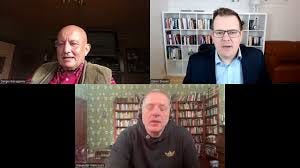Russia Changes Nuclear Doctrine & Prepares for War
Sergey Karaganov, Alexander Mercouris & Glenn Diesen
I had a conversation with Professor Sergey Karaganov and Alexander Mercouris about Russia changing its nuclear doctrine. Karaganov was an advisor to Brezhnev, Gorbachev, Yeltsin and Putin. He has been the main proponent of lowering Russia's nuclear threshold. Putin had previously told Karaganov that Russia was not prepared to change the nuclear doctrine, however Putin has reversed his position and is now changing the nuclear doctrine according to Karaganov’s recommendations.
Nuclear weapons are the ultimate deterrent and can therefore be a source of stability and peace by making war between the great powers unacceptable. The irony of the nuclear deterrent is that the immensely destructive power of nuclear weapons, possibly ending human civilisation, can reduce the credibility that an opponent would use them. The nuclear peace therefore requires communicating a credible readiness to destroy the world.
NATO’s escalations in the Ukraine War have convinced the Kremlin that its nuclear deterrent has been severely weakened and must be restored. For example, Biden initially warned against sending F-16s as it would likely trigger World War 3, but then decided later to approve supplying F-16s to Ukraine while NATO countries dismissed Russia’s nuclear deterrence as unacceptable “nuclear blackmail”. On the third year of the war, Ukraine invaded Kursk with NATO weapons and likely US intelligence - which was met with Western support and exuberance.
The dilemma for how Russia can respond has been: 1) retaliate against NATO and risk uncontrolled escalation possibly resulting in nuclear war, or 2) do not to retaliate but then embolden NATO to escalate further and thus risk nuclear war. The plan by the US and UK to supply Ukraine with long-range precision missiles became the final straw for Moscow. This would be considered a direct attack on Russia since these missiles would need to be operated by American or British soldiers and guided by their satellites.
The changes primarily entail 1) allowing the use of nuclear weapons if attacked by a non-nuclear state supported by a nuclear state (to address war through proxy), 2) placing Belarus under the Russian nuclear umbrella to address the possibility of a NATO nuclear attack on Belarus as a step up the escalation ladder. Obama’s national-security team secretly staged a war game in 2016 in which it was recommended to respond to a Russian use of nuclear weapon with a NATO nuclear attack on Belarus - “a nation that had played no role whatsoever in the invasion of the NATO ally but had the misfortune of being a Russian ally”.
Changing the nuclear doctrine does not suggest Russia is planning a nuclear strike as there are still further steps on the escalation ladder:
Confront and destroy NATO reconnaissance drones over the Black Sea that provide targets to Ukraine
Use conventional weapons to attack NATO’s military targets that are used to put a blockade on Kaliningrad (if the decision is made)
Destroy NATO satellites used to guide missiles that attack Russian territory
Destroy NATO’s critical infrastructure such as underwater cables or through cyber attacks
Destroy Ukrainian warplanes stationed in Poland and Romania
Destroy military logistics centres on NATO territory for weapons being sent to Ukraine
Attacks on US military bases abroad, either through proxies or direct attacks
However, once any of these retaliatory actions are taken against NATO, both sides could lose control of the situation and rapidly head up the escalation ladder.
The Duran: https://rumble.com/v5jjl8l-russia-changes-nuclear-doctrine-sergey-karaganov-alexander-mercouris-and-gl.html?e9s=src_v1_ucp




Hei Glenn! Etter å ha sett den seneste YouTube videon din med Mearsheimer og Mercouris samt nyheter i dagens media har jeg ett spørsmål du kan gruble på:
According to some reports, including comments attributed to U.S. Secretary of State Lloyd Austin, there is speculation that North Korea may be sending troops to support Russia in Ukraine. I am unsure of the accuracy of these claims. However, it has also been suggested that South Korea might be considering sending troops and weapons to Ukraine in response. My question is: how would Russia react if non-NATO U.S. allies, such as South Korea, were to send weapons or personnel to Ukraine? Would Russia treat this differently from NATO countries sending aid? Would Moscow view this as a direct extension of U.S. involvement, or would there be a significant difference due to these countries being outside of NATO? How might this affect Russia's deterrence strategy?
Takk for fantastisk dekning, og for at du står opp og er en tydelig motvekt til dagens orwellianske verden
Isn’t it a shame that all of this could have been avoided if we had just listened to John Mearsheimer…